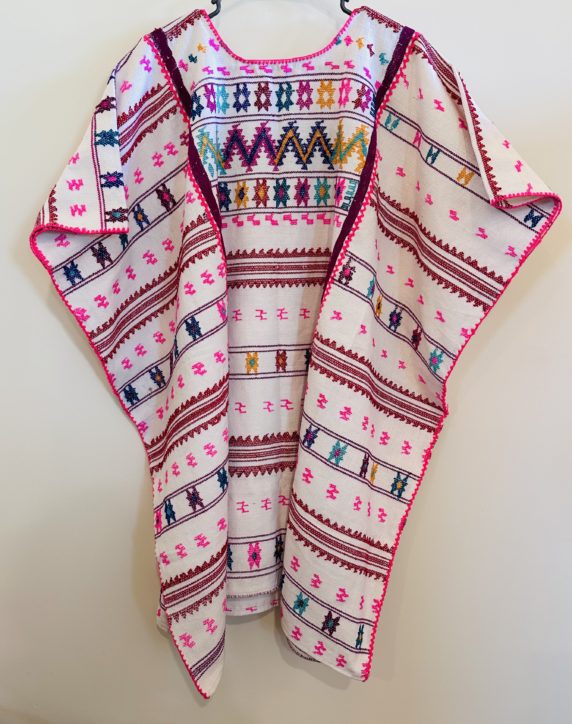We know the Sunday market (tianguis) in Tlacolula is amazing. When you visit Oaxaca, this is a don’t miss it moment! (Order a map from us to find your way around.) And, if you want the real deal in Oaxaca food, you want to try out one of the off-the-beaten-path traditional cocina de humo comedors operated by one of Oaxaca’s traditional cooks in this market town. A cocina de humo is a complex sensory experience with humble roots in outdoor, wood-fired, comal-based cooking. You don’t have to be a foodie to appreciate what comes off a cal coated clay comal, the essential cooking platter of every traditional Mexican home. This large, round griddle platter can be as big as sixteen or eighteen inches in diameter. It sits atop a fogon made from adobe that is usually thirty-six inches high and fueled with wood. Comales are made wherever clay is found and in Oaxaca they come from San Marcos Tlapazola and in Santa Maria Atzompa.

Cocineras Tradicionales are what they are called. These are women who were born and raised in the culture of home cooking and organic corn, learning from mothers, grandmothers and great-grandmothers. They buy or grow their own organic produce, take the corn their families cultivate to the local mill (molina), and make their own masa using a traditional metate or grinding stone. The corn here is real food, grainy, nutty, crunchy to the taste, filled with flavor and energy. Their salsas are all scratch made in the molcajete. Their menus change based on seasonal ingredients.


Their restaurants are simple outdoor kitchens or ones tucked into the corner of their small establishments that might seat ten or fifteen people comfortably. If you know anything about fine French cuisine, you know that the Great Chefs of France — Paul Bocuse, Alain Chapel, Georges Blanc — all started in Lyon, learning from mothers, grandmothers and great-grandmothers, too. The similarities are strong. And, it’s about time that the great traditional cooks of Oaxaca villages are coming into their own.

Here are our recommendations for delicious, real Oaxaca village food in order of our preferences:
Mo-Kalli. Cocinera Tradicional Catalina Chavez Lopez opened a small comedor three years ago in the Tres Piedras neighborhood of Tlacolula up a dirt road on the east side of MEX 190. I went there four times in the month that I discovered it. I took my Zapotec family there and they raved about the moles. The meal is about 250-300 pesos per person and includes an appetizer, entree, dessert and fruit water. Beer and mezcal are an additional cost.

What I love about Mo-Kalli is the selection of moles. Catalina has at least seven ollas (cooking pots) bubbling away on top of her traditional cooktop, filled with (usually all of) Oaxaca’s famous moles: negro, rojo, coloradito, segueza (cracked corn kernels), verde or pipian (green), amarillo (yellow), chichilo (a somewhat bitter taste, served at funerals), and manchemanteles (tablecloth stainer, sweet with raisins and nuts). There is no menu. She brings a sampler of moles to the table that you taste with a crispy tortilla piece. Then, you decide which you want. Catalina recommends which meat (chicken, beef, pork) will go best with each sauce.



I’ve had the mole negro, the segueza and the amarillo, and coloradito. All are superb. The hospitality is out of this world. All the meats are succulent and easy to chew. If you get there, please tell her I sent you!



Nana Vira. Evangelina Aquino Luis, Cocinera Tradicional, does her cooking magic about six blocks south of the Tlacolula Market and is open Tuesday through Sunday. There is an upstairs dining terrace, and a couple of tables and benches on the ground floor next to the outdoor kitchen. We ate there after spending a couple of hours meandering the Tlacolula Market. Parking can be challenging (we do have a car), so the easiest way to get there is to hail at moto-taxi (tuk-tuk) at the corner where the Banamex is located. Eva will call you a moto to get you back to Centro. I had barbecue ribs slathered in a milder mole rojo. The fare here is a bit simpler and the prices are a la carte (no comida corrida). They make and bottle their own mezcal brand, too.

Criollito. Liliana Palma Santos was born and raised in Santa Monica, California, and returned to her family’s native Tlacolula de Matamoros about ten years ago. She and her husband opened this comedor to replicate family recipes passed through generations. They are known for their rainbow (arco iris) tortillas that incorporate three or more types of native corn, including yellow, blue, and red. Only open on Saturday and Sunday, this outdoor kitchen has three tables and can seat about twelve people at a time. I made a reservation, but it wasn’t really needed on the day we went. While Criollito is not technically considered an official Cocina Tradicional, it has all the elements to be included in this category. The three of us were feeling green vegetable deprived, so in additional to ordering tlayuda and mole negro, we started off with a comal stir-fry of broccoli, squash, and nopal cactus paddles! Price was about the same as Mo-Kalli, however did not include an appetizer or dessert.



Many of us love to eat at the market on Sunday and my favorite spot is either Comedor Mary on Avenida Galeana (side street of the church) or to belly up to one of the barbacoa tables inside the market where you can get a goat taco or consume. However, I encourage you to stretch your discovery wings and go find one of these comedors. Start with Mo-Kalli!



What does it mean to be designated a Cocina Tradicional? A Cocina Tradicional, or traditional kitchen, is a Oaxaca government designation from the Secretary of Oaxaca Culture and Art [Secretaría de las Culturas y Artes de Oaxaca (Seculta)], to honor the cocineras who are keeping the ancestral food traditions alive. Most come from pueblos, the villages, located some distances from the city where regional foods and local cooking styles are ingrained in indigenous culture.
In Teotitlan del Valle, the Cocinera Tradicional is Carina Santiago who runs Tierra Antigua Restaurant. It is through her and caterer friend Kalisa Wells, that I learned about the two cocineras in Tlacolula, because they are all invited to participate in foodie events throughout Mexico and the USA to represent Oaxaca at official culinary programs.








































